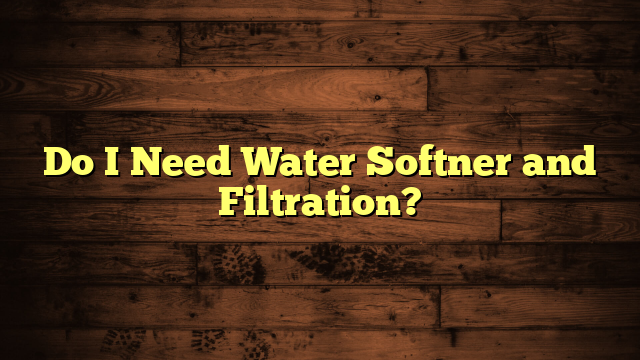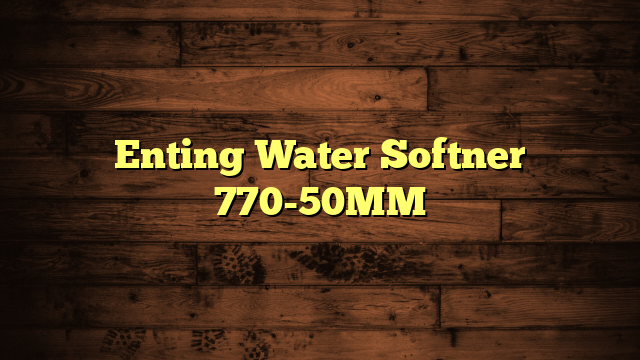Do I Need Water Softner and Filtration?
You might wonder if hard water really affects your household's health and appliances as much as people say. The truth is, hard water can lead to scale buildup and damage over time, but that's just part of the equation. What if your water also contains harmful contaminants that could compromise your well-being? Evaluating both hardness and potential pollutants is essential to making an informed decision. So, how do you determine if you need a water softener, a filtration system, or both?
Key Takeaways
- If your water has high levels of calcium and magnesium, a water softener can prevent scale buildup in appliances and pipes.
- If your water contains harmful contaminants like pesticides, heavy metals, or bacteria, a filtration system is essential for safety and quality.
- Water softeners improve appliance lifespan and reduce cleaning efforts, while filtration systems enhance taste and eliminate health risks.
- Assess your water quality to determine if both systems are necessary for optimal results—softeners for hardness, filtration for impurities.
- Consider your budget and space; softeners require more maintenance and space compared to compact filtration options.
Understanding Hard Water
Understanding hard water is essential if you want to maintain the quality of your home's water supply. Hard water primarily comes from natural sources, like groundwater that flows through limestone and chalk. These minerals, mainly calcium and magnesium, dissolve into the water, raising its hardness levels.
Identifying hard water sources in your area is vital, as it helps you understand the potential impact on your plumbing and appliances.
To truly grasp the hardness of your water, you should consider hard water testing. This involves measuring the mineral concentration in your water supply, often using a simple test kit available at local hardware stores.
Testing not only reveals the hardness level but also helps you determine whether you need to implement a solution like a water softener. Regular testing can also alert you to changes in water quality, ensuring that you're always informed.
Effects of Hard Water
Hard water can wreak havoc on your home and daily life. The presence of minerals, like calcium and magnesium, leads to mineral buildup in various areas. This buildup can affect everything from your plumbing to your appliances, resulting in costly repairs and replacements. Here's a look at some common effects of hard water:
| Effect | Description |
|---|---|
| Appliance Damage | Hard water can reduce the lifespan of appliances, like dishwashers and water heaters, due to mineral deposits. |
| Plumbing Issues | Mineral buildup in pipes can cause clogs, diminishing water flow and pressure. |
| Skin and Hair Problems | You may notice dry skin or dull hair after showering, as hard water can strip away natural oils. |
| Stains and Spotting | Hard water leaves unsightly stains on dishes and fixtures, making cleaning a constant chore. |
| Increased Soap Usage | You'll find yourself using more soap and detergent to achieve lather and cleaning power, leading to higher costs. |
Benefits of Water Softeners
Using a water softener can make a significant difference in your home.
It prevents scale buildup in your pipes and appliances, which enhances their efficiency and lifespan.
Prevents Scale Buildup
A water softener effectively prevents scale buildup, which can be a major headache for homeowners. Scale, formed from hard minerals like calcium and magnesium, accumulates over time in pipes and appliances. This can lead to costly plumbing maintenance and repairs. By using a water softener, you can enjoy cleaner fixtures and extend the lifespan of your plumbing system.
Here's a quick look at the impact of scale buildup and the benefits of scale prevention:
| Impact of Scale Buildup | Consequences | Benefits of Water Softeners |
|---|---|---|
| Reduced Water Flow | Clogs in pipes | Improved water pressure |
| Appliance Damage | Shortened appliance lifespan | Longer-lasting appliances |
| Increased Energy Bills | Less efficient heating | Lower utility costs |
| Stains on Fixtures | Hard water stains | Cleaner, shiny surfaces |
| Time-Consuming Cleaning | Frequent scrubbing required | Less cleaning effort |
Investing in a water softener is not just about comfort—it's about proactive scale prevention. You'll save time, money, and hassle in the long run, ensuring your home runs smoothly. So, consider a water softener to keep your plumbing in top shape!
Enhances Appliance Efficiency
Scale buildup not only affects your plumbing but also considerably impacts the efficiency of your appliances. When hard water flows through your home, it leaves behind mineral deposits that can clog pipes and damage appliances over time.
You mightn't realize it, but this buildup can lead to decreased appliance longevity and increased energy costs. For instance, your dishwasher and washing machine have to work harder to clean your dishes and clothes when scale accumulates inside them.
This not only shortens their lifespan but also raises energy consumption, as they struggle to perform their jobs effectively. By installing a water softener, you can enjoy smoother operation, which enhances energy efficiency across all your appliances.
When your appliances run more efficiently, you save money in the long run on repairs and replacements. Plus, you'll experience the added benefit of cleaner dishes and fresher laundry.
It's a win-win situation! So, considering a water softener isn't just about comfort; it's a smart investment in your home's appliances and your budget.
Types of Water Softeners
When it comes to choosing a water softener, you've got a few main options to contemplate.
Ion exchange softeners, salt-free systems, and magnetic water softeners each offer unique benefits and functionalities.
Understanding the differences between these types can help you pick the best solution for your home's water quality needs.
Ion Exchange Softeners
Ion exchange softeners are a popular choice for treating hard water, effectively removing calcium and magnesium ions that cause mineral buildup.
These systems utilize a process called ion exchange, where hard water passes through a tank filled with resin beads. These beads are coated with sodium ions, which are exchanged for the calcium and magnesium ions in the water.
As the hard water flows through, the resin beads attract and hold onto the unwanted minerals, releasing sodium ions in their place. This process not only softens the water but also helps protect your plumbing and appliances from scale buildup.
You'll notice softer skin, shinier dishes, and cleaner laundry when you use softened water.
After a certain period, the resin beads become saturated with calcium and magnesium and need to be regenerated. This is typically done using a salt solution that flushes out the hard minerals, replenishing the sodium ions on the beads.
With regular maintenance, ion exchange softeners can provide you with consistently soft water, making them an effective solution for many households dealing with hard water issues.
Salt-Free Systems
Salt-free systems offer an alternative solution for those looking to treat hard water without the use of salt or chemical additives. These systems utilize innovative technologies to condition water, preventing scale buildup on your pipes and appliances.
Unlike traditional water softeners that rely on ion exchange, salt-free alternatives work by altering the structure of minerals in the water, making them less likely to form deposits.
You might appreciate these eco-friendly solutions, as they don't add sodium to your water supply. This can be particularly beneficial for individuals on low-sodium diets or those concerned about environmental impact.
Furthermore, salt-free systems require less maintenance and don't waste water during regeneration, making them a sustainable choice for many households.
While they may not completely "soften" water in the traditional sense, salt-free systems can greatly reduce the negative effects of hard water.
As you consider your options, weigh the benefits of these systems against your specific needs. If you're looking for an effective way to manage hard water without the drawbacks of salt, a salt-free system may be just what you need.
Magnetic Water Softeners
Magnetic water softeners present another innovative approach to dealing with hard water issues, complementing the benefits of salt-free systems. These devices utilize magnetic technology to alter the physical properties of minerals in water, helping to reduce scale buildup.
While their softener effectiveness can vary, many users find them to be a practical solution.
Here are four key points to reflect on regarding magnetic water softeners:
- Installation Ease: They're typically easy to install, requiring minimal plumbing work.
- No Salt Needed: Since they don't use salt, you won't need to worry about added sodium in your water supply.
- Eco-Friendly: These systems are environmentally friendly, producing no waste and requiring no chemicals.
- Maintenance-Free: Most magnetic systems require little to no maintenance, making them convenient for busy households.
While magnetic water softeners can be an effective option, it's important to assess your specific water needs.
They may not entirely replace traditional salt-based softeners in every situation, but they provide a valuable alternative for many homeowners seeking to manage hard water issues effectively.
Importance of Water Filtration
Water filtration plays an essential role in guaranteeing the quality and safety of the water you consume. It protects you from harmful substances and enhances the overall taste. Different filtration methods, such as activated carbon, reverse osmosis, and ultraviolet light, help remove impurities, sediments, and contaminants from your water supply.
When you choose the right filtration method, you're investing in better water quality for you and your family.
By filtering your water, you can also reduce the risk of health issues that arise from consuming unfiltered water. Whether you're concerned about chlorine, lead, or other pollutants, a good filtration system can greatly improve your peace of mind.
You'll notice a difference in not just drinking water but also in cooking and bathing. Clean water can lead to healthier skin and hair, making daily activities more enjoyable.
It's important to assess your specific needs when selecting a filtration system. Consider factors like your water source, existing contaminants, and your family's usage patterns.
With the right approach, you can guarantee that you're drinking safe, clean water every day. Taking this step is vital for maintaining good health and overall well-being.
Common Water Contaminants
Many households face the challenge of dealing with common water contaminants that can affect both health and taste. Understanding these contaminants is essential for making informed decisions about your water supply.
Here are four typical offenders you might encounter:
- Chemical Pollutants: These can include pesticides, heavy metals, and industrial chemicals. They often seep into water sources and may pose serious health risks.
- Biological Contaminants: Bacteria, viruses, and parasites fall into this category. These microorganisms can lead to gastrointestinal illnesses and other health issues if ingested.
- Chlorine and Chloramines: While these chemicals help disinfect water, they can leave an unpleasant taste and odor. Prolonged exposure may also have health implications.
- Hardness Minerals: Calcium and magnesium can make your water hard, leading to scale buildup in pipes and appliances. While not harmful, it can impact the overall quality of your water.
Comparing Softeners and Filtration
When it comes to improving your home's water quality, understanding the differences between softeners and filtration systems can make all the difference. Both options play essential roles, but they target different issues. A water softener focuses on removing hard minerals like calcium and magnesium, enhancing softener efficiency and preventing scale buildup in your pipes and appliances. On the other hand, filtration methods aim to eliminate contaminants such as chlorine, sediments, and bacteria, providing cleaner, safer drinking water.
Here's a quick comparison to help you visualize their differences:
| Feature | Water Softeners | Filtration Systems |
|---|---|---|
| Primary Function | Reduces hardness minerals | Removes impurities and contaminants |
| Key Benefit | Prevents scale buildup | Improves taste and safety |
| Maintenance Requirement | Regular salt replenishment | Filter changes as needed |
Making the Right Choice
Choosing between a water softener and a filtration system depends on your specific water quality needs. Understanding what each option offers can help you make an informed decision. Here are a few considerations to guide your softener selection and filtration options:
- Water Hardness: If you frequently experience mineral buildup or soap scum, a water softener can reduce hardness and improve your water's feel and taste.
- Contaminants: If your water contains harmful substances like chlorine or lead, a filtration system is essential for removing those impurities and ensuring safe drinking water.
- Budget: Consider the initial cost and ongoing maintenance expenses of both systems. A water softener typically has lower operating costs, while filtration systems may require more frequent filter replacements.
- Space: Evaluate your available space, as water softeners often need a dedicated spot, while some filtration systems can be compact and installed under the sink.
Frequently Asked Questions
How Do I Know if I Have Hard Water?
To know if you have hard water, look for signs like soap scum, scale buildup, or dull laundry. You can also use testing kits to measure mineral levels and confirm your water's hardness.
Can I Install a Water Softener Myself?
You might think DIY installation of a water softener is intimidating, but with the right tools and guidance, you can tackle it. Just make sure you've got all necessary softener tools before starting your project!
What Maintenance Do Water Softeners Require?
Water softeners require regular maintenance to function effectively. You should check salt levels monthly and replenish as needed. Furthermore, perform system cleanings every few months to guarantee peak performance and prevent buildup.
Are There Any Health Risks With Softened Water?
Did you know that nearly 85% of U.S. households deal with hard water? While softened water can reduce scale buildup, excessive sodium levels may pose health effects, especially for those on low-sodium diets.
How Much Does a Water Softener Cost?
Water softener prices typically range from $400 to $2,500, depending on the system's capacity and features. Installation costs can add another $200 to $500, so budget accordingly to guarantee peak performance for your home.
Conclusion
In summary, whether you need a water softener, a filtration system, or both really depends on your water quality. If you're battling hard water, a softener can be your knight in shining armor, protecting your appliances and skin. On the flip side, if your water's got contaminants lurking like villains, a filtration system is essential for safe drinking. Assess your specific needs, and you'll find the right solution to guarantee your water is both soft and clean!







